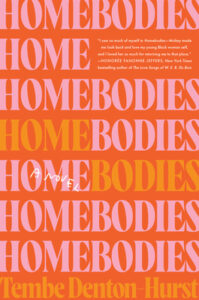Amazon Affiliate Link | Bookshop.org Affiliate Link
Mickey is a Black queer author in NYC trying to make a name for herself. She knows that she’s a great writer, with incisive commentary and an eye for the kinds of stories that tap into the conversations happening right now. The problem is she doesn’t have much of an opportunity to use these skills. The magazine she writes for has new ownership who are skeptical of her ideas, especially the ones that centre Blackness or queerness. She’s stuck writing inane celebrity news stories on tight deadlines, coming home exhausted.
She lives with her girlfriend, Lex, who is supportive and caring—and also close with her mother, who rejects Mickey and Lex’s queerness in general. She’s tried to break them up multiple times. Despite all the good in their relationship, it’s a fight they circle back to over and over.
This is a quiet, contemplative novel about a low point in Mickey’s life. It’s so character-based that it’s hard to describe the plot without spoiling anything: the events on the back cover don’t all happen until about 75% of the way through the book. So if you don’t want to know anything about what happens — though this book really isn’t about the events as much as Mickey’s processing of them—keep that in mind.
When Mickey is fired from her job and quickly replaced, she free falls. Lex worries that she’s just staying on the couch eating takeout for weeks, not even looking for a new job. But Mickey faced so much racism at her last job, including in how she was let go, that she’s not sure what to do now. So she does the last thing she expected from herself: she goes home, to Maryland. While staying with grandmother, she grapples with what to do next—made even more complicated when she bumps into her ex.
Tembe Denton-Hurst wrote an article at the Cut titled “It Doesn’t Matter If We Behave” that offers some background into why she wrote Homebodies, especially in the impossible standards for “professionalism” for Black women. She explains that she wanted to provide Mickey a “soft place to land,” a chance to process her feelings, instead of having to just push through and follow the unwritten rules of navigating these spaces as a Black woman.
I felt so tense reading the first section of this book, because as someone who now works in digital media, her experience feels like a literal nightmare. Writing on strict deadlines, having a supervisor who clearly doesn’t respect you, going through endless microaggressions that have the thinnest veneer of plausible deniability so that you can’t point to any one thing as the glaring example—I can’t imagine doing that day after day.
Mickey is a bit of a mess, and this is a confusing in-between point in her life. It’s mostly interior, and there are no neat conclusions to her story. She’s still figuring herself out, still deciding how to navigate a no-win situation. This is one I’m really interested to see other readers’ response to, especially other queer Black women.

